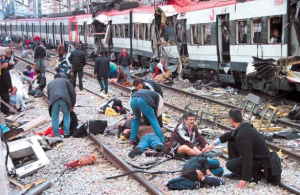 What is muscle memory? Muscle memory has been used to describe the observation that various muscle-related tasks seem to be easier to perform after previous practice, even if the task has not been performed for a while. It is as if the muscles “remember”.
What is muscle memory? Muscle memory has been used to describe the observation that various muscle-related tasks seem to be easier to perform after previous practice, even if the task has not been performed for a while. It is as if the muscles “remember”.
There I am in the desert, a wounded man is screaming on the ground from a blast that just when off. Weapons are discharging around me and I can smell the gasses emitted from the powder. My mind is completely shut down and the sounds have turned to a steady drone of noise. But my fingers and hands are completely still as they tighten the tourniquet on his leg and begin prepping the IV bag, tubing, and needle. I see the veins on his arm and setting the needle over the cleaned area me minds rehearses “one, two three, stick…flash.” I slide the catheter up the vein; a perfect first time stick. Then the OC calls ENDEX. The day’s training event is over. I’m proud of how I’ve performed at the end of a stressful day of combat training at Ft. Bliss.
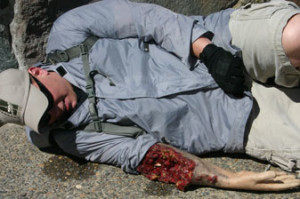 While I’ve never had to actually administer an IV in a combat situation I’ve given two to heat casualties; and let me tell you, it is an SOB when the veins are constricted and rolling around. In another training event I found myself as a backseat window licker suddenly in charge of a convoy under fire because the other NCOs are wounded and the OCs want to see how a back seat window licking Junior NCO will respond to the world falling apart around him. In that case the training also kicked in and I got props for both the aggressive response to hostiles, finding a safe route back to base, and the casualty care and evacuation I had to coordinate.
While I’ve never had to actually administer an IV in a combat situation I’ve given two to heat casualties; and let me tell you, it is an SOB when the veins are constricted and rolling around. In another training event I found myself as a backseat window licker suddenly in charge of a convoy under fire because the other NCOs are wounded and the OCs want to see how a back seat window licking Junior NCO will respond to the world falling apart around him. In that case the training also kicked in and I got props for both the aggressive response to hostiles, finding a safe route back to base, and the casualty care and evacuation I had to coordinate.
Honestly, while I hate being put in the spot light and taking charge; it gives me a real rush. Watching the training kick in while chaos (by design) erupts around you. Militarily, training to react under stressful circumstances without hesitation starts on the first day of basic. Why do we subject ourselves to training that is designed for realistic stressful situations? Everyone knows it is easier to practice an IV stick in a classroom environment, not in the dusty desert heat with everyone yelling and firing weapons around you. Not to mention it being bad for your hearing.
As an artilleryman on my first deployment we practiced dry fire missions every single day, so that when an actual fire mission came down our reaction time was superb and our actions precise. They had to be because lives might be depending on them; and in counter battery fire we were trying to hit insurgent mortar/rocket teams before they could vacate the AO (area of operation) to shoot at us again on another day. The fire mission, like so many other military maneuvers, was broken down to a set of steps and verbiage that I can still recite in my sleep; called crew drills. Those steps ensured we fired safely, quickly, and accurately. So why not take the same approach to possible events in civilian sector emergencies?
I’m using muscle memory here as a general term to describe any kind of reflexive actions that could save your life; another great synonym is conditioning. So think of the different terms I use here as possessing the same general meaning. As a kid in elementary school we did so many earthquake drills that had the ground started moving I would have instinctively know to get under my desk and cover my head.
Why does this matter? The down and dirty is that in an emergency or fear provoking situation, our ability to reason and calculate is severely diminished; we literally lose the ability to focus on the simplest tasks and our raw instincts take over. This simple article is to get you mind thinking about steps you can take to increase your reflexive reaction.
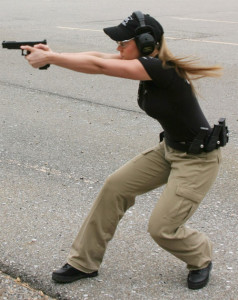 We can increase our chances of survival by repetition and conditioning our bodies to react to certain environments and situations without having to think. One of the greatest examples of this is reflexive shooting. Development of this skill is why military branches throughout the US use both stationary targets to enhance precision shooting, and pop-up targets that condition your body to quickly draw aim and fire the weapon before the target drops out of sight. In room clearing we learn to differentiate between enemy combatants and civilians as fast as our eyes make contacts, and to fire on the move while still hitting our targets and getting out of the fatal funnel. Before actual hits, SWAT teams and operations groups will go through “glass houses” hundreds of times so they instinctively know every corner, doorway, and window. Why shouldn’t you know your house just as well, should a thief enter your home during the night? You should have the home turf advantage.
We can increase our chances of survival by repetition and conditioning our bodies to react to certain environments and situations without having to think. One of the greatest examples of this is reflexive shooting. Development of this skill is why military branches throughout the US use both stationary targets to enhance precision shooting, and pop-up targets that condition your body to quickly draw aim and fire the weapon before the target drops out of sight. In room clearing we learn to differentiate between enemy combatants and civilians as fast as our eyes make contacts, and to fire on the move while still hitting our targets and getting out of the fatal funnel. Before actual hits, SWAT teams and operations groups will go through “glass houses” hundreds of times so they instinctively know every corner, doorway, and window. Why shouldn’t you know your house just as well, should a thief enter your home during the night? You should have the home turf advantage.
I was doing training with the local sheriff’s department some years ago and learned that they practice room clearing in many public buildings after hours, especially schools. This is so that in the advent of an active shooter they know the terrain and have rehearsed and refined their actions.
There are variations to this rule, but I’ve always preferred the generalized 10-80-10 rule I first read about in The Survivor’s Club. Roughly ten percent of people in an emergency situation will keep their wits about them and react appropriately to what is going on, roughly ten percent will completely succumb to panic and let their physiological and emotional responses control how they react, and roughly eighty percent will stand around with a dumbfounded expression on their face, unable to process or grasp what is happening around them.
And I don’t blame the 80%, I’ve been there. The first time I came across a motorcycle accident (not even that serious of one), I got out of my vehicle and had no idea what to do. I even had a great first aid kit in my trunk; but didn’t think to pull it out. I’m sure common sense would have kicked in over the next minute or two, but an off duty police officer showed up before I could react and took charge. Many of us have had those situations because we haven’t conditioned ourselves, or built the muscle memory to act.
If your kid is choking what is your first reaction? Do you sit there frozen feeling your mind dump everything you’ve ever learned and not having a clue what to do? Likely, you are not going back and remembering that single first aid course you took five years ago on how to respond. But through repeated refresher training you can condition yourself to react without having to think.
Does a paramedic have to calm his breathing when he shows up on a scene and go through a mental check list for responding? Likely that paramedic has trained and conditioned himself to immediately start rendering first aid without having to stop and think about it. A friend of mine, and former paramedic, stated there is something of a rush in being able to show up on a scene of utter chaos, and take charge; rendering first aid while direction those around you with what they need to be doing.
Mike Tyson said in 1966 “Fear is your best friend or your worst enemy. It’s like fire. If you can control it, it can cook for you; it can heat your house. If you can’t control it, it will burn everything around you and destroy you. If you can control your fear, it makes you more alert, like a deer coming across the lawn.”
Military and first responder organizations also provide great medical training that often involves realistic gory wounds while purposefully stressing the trainee via fatigue and a noisy active environment, to react and render aid without having to think about what they are doing.
Throwing personnel into leadership positions during the heat of training events can condition troops to take charge and direct subordinates reflexively without having to think about troop leading procedures as the SHTF around them.
Drilling common sense reactions into your children’s heads might keep them alive if they get separated from you in to the woods. I ask my kids on a regular basis what are the three rules of they are alone in the woods? Without thinking the reply in their classic bored tone: stay where you are (don’t run), call for help or use the whistle around their necks, and answer if someone is calling their names (as they will never be in trouble for getting lost). It’s a good sign when they don’t have to recall memory or think about what has been drilled into them.
If you hear something break downstairs in your house at night are you going to close your eyes and play it off as an over active imagination or are you going to pick up a fire arm and do a quick sweep of your house as you’ve been practicing for just such a situation? I know I’ve cleared my house many times when I’ve been spooked, even though I’ve never actually caught someone there.
Do you practice basic weapons skills like reloading your magazines, performing immediate and remedial actions for a misfires or jammed weapons, and flicking the safety on and off before and after shooting? If a criminal fires at you are you trying to return fire with a weapon on safe? Or are your shaking hands dropping magazines as you try to reload? Try firing at the range after running to get your heart rate up and having your friends screaming at you. There are things you can do to mimic the adrenaline and fear you will feel in a real situation.
Anything to get your heart rate up and making training as realistic as possible will help condition your reaction time and ability. Take adversity as a positive challenge because you will never react to a situation under optimal circumstances.
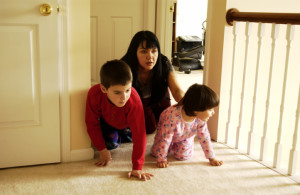 Most of us are not rendering lifesaving first aid or engaging in combat operations on a daily basis; but we can condition our bodies to react in the right way. Always find ways to give yourself a one up on any situation. Do you think you’ll be able to wrestle a knife out of someone’s hands if you’ve never training in any kind of combatives? Does your family know how to respond to a house fire? Realize that fear is a normal response, as is you mind shutting down; but they don’t have to stop you from doing what needs to be done. Sign up for professional fire arms classes or medical training. Develop and rehearse plans of actions (POAs) with your family so they can react in most situations without having to think, like fire and earthquake drills.
Most of us are not rendering lifesaving first aid or engaging in combat operations on a daily basis; but we can condition our bodies to react in the right way. Always find ways to give yourself a one up on any situation. Do you think you’ll be able to wrestle a knife out of someone’s hands if you’ve never training in any kind of combatives? Does your family know how to respond to a house fire? Realize that fear is a normal response, as is you mind shutting down; but they don’t have to stop you from doing what needs to be done. Sign up for professional fire arms classes or medical training. Develop and rehearse plans of actions (POAs) with your family so they can react in most situations without having to think, like fire and earthquake drills.
Once again, my only intent with this post is to get your mind turning, not lay out a plan for you. It is your job to evaluate your environment and plan what to prepare for.
Jon
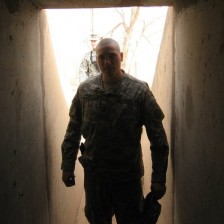
Leave a Reply